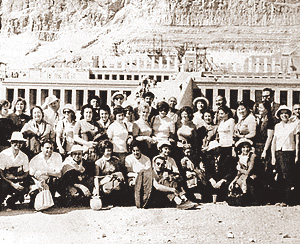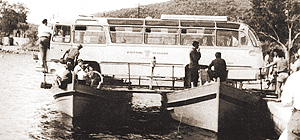More than a Memory
FROM AN OLD NOTEBOOK OF A TOURISM REPORTER
Old Traces for New Morals
It was a different way of living, loving, being happy and traveling. Everything was much poorer and much richer. You got more with less, it was somehow sweeter, more fulfilling and deeper. Although there was no talking about experts for all kinds of things, specialists and gurus, it seems that people knew much more about some simple and important things than they do today. Before us are four lovely stories with morals from different periods of the second half of the XX century. Can anything from them be applied in our time of boring pretentiousness?
By: Srba Janković
 It seems that camps are trendy again. For a while now, the European roads towards the south and the warm seas have a growing number cars with tents on their roof or those pulling camping trailers. Tourists with this equipment say that with such vacations they are closer to nature. Perhaps the real reason is hiding in the wallet, as the financial analysts claim. Still, these pictures from the motorways bring back memories of the second half of the previous century, when spending summers in camps was a real hit... It seems that camps are trendy again. For a while now, the European roads towards the south and the warm seas have a growing number cars with tents on their roof or those pulling camping trailers. Tourists with this equipment say that with such vacations they are closer to nature. Perhaps the real reason is hiding in the wallet, as the financial analysts claim. Still, these pictures from the motorways bring back memories of the second half of the previous century, when spending summers in camps was a real hit...
At that time, the most prestigious camp for transiting tourists on the Corridor 10 was in Serbia, the entrance lobby of the Mediterranean (after sleeping over, it took one day most to reach the magical rivieras of the furthest South). That Serbian camp was very reputable and had good recommendations in the ”Michelin” guide, a kind of the campers’ holy book. It was managed according to the European Campers’ Association rules, but also offered at least ten unconventional conveniences, in the best manner of traditional Serbian hospitality. It was located on the 200th kilometer of the highway south of Belgrade, near Aleksinac, in a spacious grove on the right bank of the South Morava. Around it were a motel, two petrol stations, car mechanic, a restaurant with a garden under the branches of a hundred years old walnut tree, and an old mill in the river, as a balcony, if someone wishes to be close to the water or to fish.
Campers from Europe were first greeted with warm bread, salt, a glass of supreme brandy, a flower for ladies, a souvenir. They could pick for free anything they need for dinner in the garden and the plentiful orchard. Several washing machines were at their disposal (at least for the most necessary clothes for the following day and the trip to the sea). Guests here had doctors and specialists 24 hours a day. They could read their favorite newspaper with a day delay, because the camp was subscribed to the most famous dailies from almost all European capitals.
The receptionists who entered the names of guests had, among other things, the obligation to take care if any guest of the camp was celebrating his or her birthday. Such guest would receive a cake, a bottle of wine and a souvenir.
If the car of any of the guests with reservations would break within a hundred kilometers from the camp, they would send the tow truck and mechanic for free. If any of the guests would wish to fish in the Morava, he or she would get a free license at the reception desk and if the catch was good, the cook would prepare the fish for free.
The first reservations at the time were made by campers’ clubs. Later, as people began gaining confidence in the camp, the guests did it for themselves, for family members and friends. Thus the camp expanded, as well as the garden, orchard, beach on the Morava…
Today, in the place where this representative camp used to be is only a plot, a piece of land, and a story about a wiser way of attracting travelers from Europe than the ones offered by actual official concepts of tourism.
GOLD COIN
 According to a very old custom in Serbia, a newly born baby is gifted with a gold coin. A baby in the house, a gold coin in the cradle – for health, luck and long life. Even the poorest ones never neglected this custom and never missed to mark the newly born with this symbolic act. According to a very old custom in Serbia, a newly born baby is gifted with a gold coin. A baby in the house, a gold coin in the cradle – for health, luck and long life. Even the poorest ones never neglected this custom and never missed to mark the newly born with this symbolic act.
This beautiful custom was accepted twenty five years ago by the Natural Sanatorium ”Mataruška Spa”. It is a well-known place for the medical treatment of young women who cannot get pregnant for medical reasons. The salutary mineral water, long and professionally guided therapies brought many of them joy. When the long awaited child is finally born, a gift arrives from the Sanatorium: a gold coin for the baby! This act, besides personal attention and participating in the joy of the patient, symbolically affirms the increase of natality, strengthening and expanding families.
Once a year, usually in the autumn, mothers with babies born thanks to the therapy in Mataruška Spa gather here for a joint festivity and exchanging gifts.
And so it has been for a quarter of a century.
And it still is.
ADVENTURE
 Each journey is accompanied with a certain extent of excitement and an aroma of adventure. At least it used to be so half a century ago when the Belgrade ”Putnik” Travel Agency launched a travel arrangement for the first organized tourist tour, named ”Surprising Excursion”... Each journey is accompanied with a certain extent of excitement and an aroma of adventure. At least it used to be so half a century ago when the Belgrade ”Putnik” Travel Agency launched a travel arrangement for the first organized tourist tour, named ”Surprising Excursion”...
It was the weekend, the night between Saturday and Sunday, at the beginning of spring of the long gone 1960. The bus started from Belgrade at first dusk, and everything was supposed to last until dawn. Shortly after the departure, the host started a quiz in the bus – whoever guesses where they were going, wins a bottle of prestigious champagne. The bus moved further to the east, so everyone announced we were going to Smederevo. However, already by Radmilovac, the bus turned to Kružni Put, and Avala could already be seen in the horizon. New guesses started: Kosmaj, Selters Spa, Arandjelovac. None of this. Driving down the Kružni Put we already reached Ibarska Highway. New tries: Vrnjačka Spa, Zlatibor... Incorrect. We again found ourselves in the middle of Belgrade, heading towards the north. Novi Sad! Or Subotica?!
Then the first surprise followed. About 10 p.m. we reached Tikvara, the fishermen settlement at the bank of the Danube hidden in the bushes and willow trees, surrounded with boats and spread nets. We stopped by an old sooty fisherman cottage covered with bunches of reed. Fires were burning in front of it, the flames were biting the dark night without moonlight. Gulash and stew were cooking in the pots, and the fish stew (it seemed so) smelled like the Danube. Catfish and carp were on the grill. The travelers were confused, completely, and the hosts started offering old mulberry brandy as appetizer.
Of course, there were also the tamburitza players, the dark skinned masters from Deronje, a village in Vojvodina famous for good musicians. Together they were playing songs from Vojvodina and invited guests to join them, to sing Djurdjevdan together. Only when we entered the cottage, we understood why this place they brought us to was called Tikvara. The walls were richly decorated with gourds of all colors and sizes (Serbian ”tikva”). And so we went deep into the night in the merry company with fish and wine.
However, a new adventure was still expecting us.
We spent the other part of the night in Fruška Gora, in the newly opened ”Iriški Venac” hotel, that is, in the hotel night club, where other young men played eternal melodies. The songs invoked emotions, lured to dancing. At dawn, we were served crêpes and champagne…
For that time, it was a truly unforgettable trip. Even half a century later, the memories are still vivid, full of details.
CRUISE
 Already the following year, 1961, the state began issuing tourist passports for traveling abroad, most often in organized tours with tourist agencies, into new adventures. Already the following year, 1961, the state began issuing tourist passports for traveling abroad, most often in organized tours with tourist agencies, into new adventures.
”Putnik”, then still the only agency in the country, prepared another tour. It was the first Serbian cruise of the three seas of the eastern Mediterranean with the ship ”Jadran”. The ship started from Rijeka and included visits to Athens, Alexandria, bus trip to Sahara, visit to Cairo, Port Said, then by ship to Rodos, then through the Corinthian Canal back to Rijeka and then by train to Belgrade. Twelve days altogether! The ensemble from ”Iriški Venac” played on the ship.
At the time, local tourists could purchase 20 dollars at the National Bank with their passport for their expenses abroad and received a certificate for it (the customs officers at the border crossings regularly checked and verified such certificates)…
|
